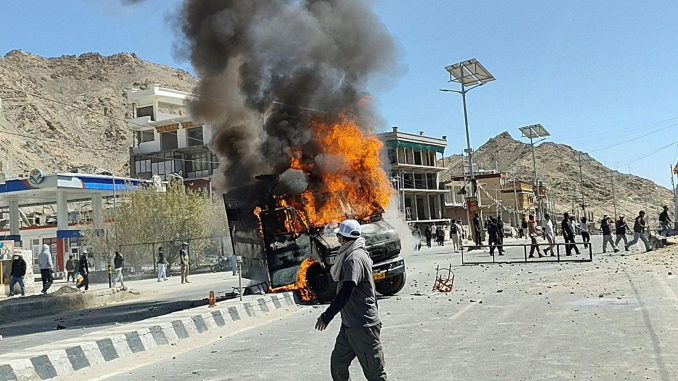
Security forces in India have imposed a strict curfew in Leh, the capital of Ladakh, after violent clashes between police and protesters demanding statehood left at least four people dead and dozens injured.
An office of the ruling Bharatiya Janata Party (BJP) was set ablaze during the unrest on Wednesday, marking the worst violence the region has seen in decades.
Authorities accused prominent activist Sonam Wangchuk, who has been spearheading the movement for statehood, of inciting the violence — a charge he firmly denies.
Wangchuk, who had been on a hunger strike since September 12, called off his fast late Wednesday and urged calm, warning that bloodshed only harms their cause.
The violence erupted against the backdrop of simmering discontent in Ladakh, a remote Himalayan desert region with a population of about 300,000, strategically located along borders with China and Pakistan.
Once part of the former state of Jammu and Kashmir, Ladakh was carved out as a separate federal territory in 2019, stripping it of its semi-autonomous status.
Since then, both the Buddhist-majority Leh district and Muslim-majority Kargil district — once divided over their political aspirations — have united in demanding the restoration of statehood and constitutional safeguards for land and jobs.
Protests have been ongoing for months, but Wednesday’s clashes were unprecedented. According to officials, demonstrators stormed the BJP’s local office, set fire to the building, and torched a police vehicle.
At least 30 police officers were injured as security forces responded with live fire and tear gas. Four protesters later died from their injuries. “In self-defence, police had to resort to firing, in which unfortunately some casualties occurred,” India’s Home Ministry said in a statement.
Wangchuk and other protest leaders insist the demonstrations were intended to remain peaceful. “There was a general sense that the federal government wasn’t listening to us,” said Padma Stanzin, one of the strike organisers. “But we never imagined it would escalate like this.”
Local religious and community leaders echoed those frustrations, warning that rising unemployment and repeated delays in talks with New Delhi have left Ladakh’s youth disillusioned. “Our people are against violence,” said Chhering Dorje Lakrook, head of the influential Ladakh Buddhist Association. “But the government’s inaction and postponements have only deepened anger.”
The unrest comes amid Ladakh’s continued strategic importance for India. The region hosts tens of thousands of Indian troops along its disputed border with China.
In 2020, a deadly clash in the Galwan Valley claimed the lives of 20 Indian and four Chinese soldiers, underscoring the region’s volatility.
Be the first to comment